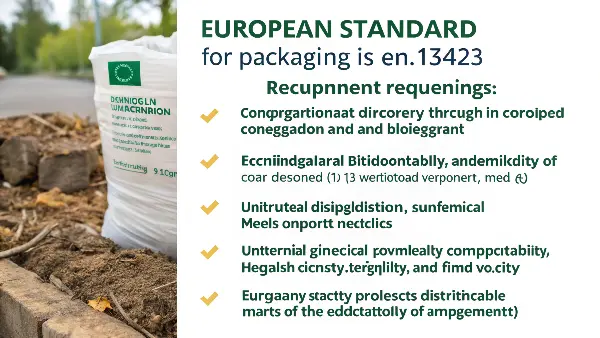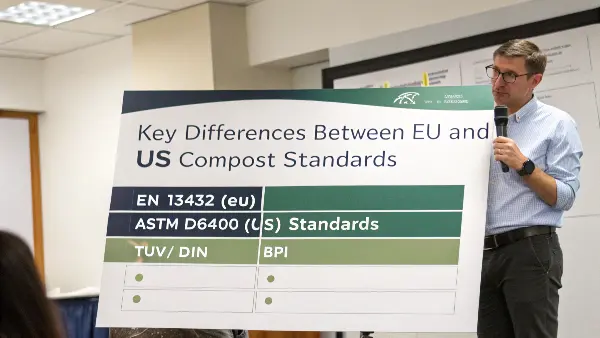Navigating the world of compostable products can be confusing with different standards like EN13432 and ASTM D6400. Misunderstanding these leads to compliance issues and lost market opportunities. Let’s clarify these key certifications.
EN13432 is the primary European standard for industrially compostable packaging, while ASTM D6400 is the equivalent specification for plastics in the US. Both ensure materials safely break down in industrial composting facilities, meeting specific criteria for biodegradation, disintegration, and ecotoxicity.
Understanding these standards is critical if you’re sourcing or selling eco-friendly products like packaging or tableware, especially across international markets. Buyers like Jacky rely on these certifications to ensure the products they source for their Canadian brand meet genuine environmental criteria. As a supplier through Ecosourcecn, we frequently guide clients through the complexities of meeting either EN13432 for Europe or ASTM D6400 for North America. Knowing the details helps you choose the right products and market them accurately. Let’s break down what each standard requires.
What is the ASTM D6400 Standard?
Trying to sell compostable products in the US market without the right credentials? Failure to meet ASTM D6400 can lead to rejected products and damage your brand’s credibility. Understanding this standard is essential for access.
ASTM D6400 is the American Society for Testing and Materials specification covering plastics designed to be composted in municipal or industrial aerobic facilities. It sets requirements for biodegradation, disintegration, heavy metal content, and lack of negative effects on the final compost.
!
ASTM D6400 provides a benchmark for plastics marketed as "compostable" in the United States. It ensures that these materials don’t just disappear visually but actually break down biologically within a specific timeframe under controlled industrial composting conditions. This standard is crucial for preventing greenwashing and ensuring materials are compatible with waste management infrastructure.
Key Requirements of ASTM D6400
| To meet this standard, a plastic material must satisfy several criteria: | Criterion | Requirement | Purpose |
|---|---|---|---|
| Biodegradation | At least 90% of the organic carbon must convert to CO2 within 180 days. | Ensures the material breaks down biologically, not just fragments. | |
| Disintegration | Less than 10% of the original material weight should remain on a 2mm sieve after 84 days in composting. | Ensures the material physically breaks down and is not visible. | |
| Heavy Metals | Strict limits on regulated heavy metals like lead, cadmium, mercury, etc. | Prevents contamination of the final compost. | |
| Ecotoxicity | The resulting compost must support healthy plant growth (tested via plant germination and biomass assays). | Ensures the material’s breakdown products are not harmful to the environment. |
Products meeting ASTM D6400 are often certified by the Biodegradable Products Institute (BPI) in North America. Seeing the BPI logo gives consumers and composters confidence that the item meets these requirements. For businesses like ours at Ecosourcecn, ensuring products meet ASTM D6400 is vital for our North American clients like Jacky.
What is the European Standard EN 13432?
Planning to enter the European market with compostable packaging? Without EN 13432 certification, your products might be barred, leading to costly setbacks. This standard is the key to accessing the EU market.
EN 13432 is the harmonized European standard specifying requirements for packaging recoverable through composting and biodegradation. It sets criteria for disintegration, ultimate biodegradability, chemical composition (heavy metals), and the quality of the final compost (ecotoxicity).

EN 13432 is the mandatory benchmark for any packaging claimed as compostable or biodegradable within the European Union. It was established to ensure that materials marketed as such are genuinely compatible with industrial composting processes and won’t harm the environment. Compliance is essential for market access and credibility across EU member states. It covers all types of packaging materials.
Key Requirements of EN 13432
| Similar to ASTM D6400, EN 13432 has stringent requirements: | Criterion | Requirement | Purpose |
|---|---|---|---|
| Material Characterization | Full disclosure of constituents and regulated limits on heavy metals and fluorine. | Ensures no harmful substances are present initially. | |
| Biodegradation | At least 90% biodegradation (conversion to CO2, water, biomass) achieved within 6 months in an industrial composting environment. | Confirms biological breakdown within a reasonable timeframe. | |
| Disintegration | After 12 weeks of composting, no more than 10% of the original mass should remain on a 2mm sieve. | Ensures the material breaks down physically into small fragments. | |
| Compost Quality (Ecotox) | The resulting compost must not negatively affect plant growth (tested via germination tests) or have other adverse ecological impacts. | Guarantees the final compost remains safe and beneficial for soil application. |
Certification bodies like TÜV AUSTRIA (OK compost INDUSTRIAL) or DIN CERTCO commonly test and certify products against EN 13432. At Ecosourcecn, we ensure our compostable products destined for Europe meet these strict criteria, providing the necessary certifications for our clients.
What Are the Key Differences Between EU and US Compost Standards?
Dealing with both EU and US markets feels complex due to different standards? Choosing the wrong certification wastes resources and blocks market entry. Understanding the core differences simplifies global compliance efforts.
While EN 13432 (EU) and ASTM D6400 (US) aim for the same outcome—safe industrial compostability—they differ slightly in scope (packaging vs. plastics), specific test details, timelines, and recognized certification bodies (TÜV/DIN vs. BPI).

Although both standards ensure materials break down effectively in industrial composting facilities, businesses need to be aware of the nuances when targeting specific markets. Both require high levels of biodegradation and disintegration, along with controls on harmful substances. However, they are not identical, and compliance with one doesn’t automatically grant compliance with the other.
Comparing EN 13432 and ASTM D6400
| Here’s a simplified breakdown of key differences: | Feature | ASTM D6400 (US) | EN 13432 (EU) | Notes |
|---|---|---|---|---|
| Primary Scope | Plastics designed for industrial composting. | Packaging recoverable through industrial composting. | EN 13432 is specifically for packaging, though materials often meet both if tested appropriately. | |
| Governing Body | ASTM International | European Committee for Standardization (CEN) | Different standard-setting organizations. | |
| Biodegradation | >=90% carbon conversion to CO2 within 180 days. | >=90% biodegradation (relative to control) within 180 days. | Very similar requirements, slight differences in test methodology measurement (absolute vs relative). | |
| Disintegration | <10% residue >2mm after 84 days (12 weeks). | <10% residue >2mm after 84 days (12 weeks). | Effectively identical requirement for physical breakdown. | |
| Heavy Metal Limits | Specific limits for certain regulated metals. | Specific limits, includes fluorine regulation. | Both control hazardous substances, EN 13432 explicitly includes fluorine limits. | |
| Key Certifiers | BPI (Biodegradable Products Institute) | TÜV AUSTRIA (OK compost), DIN CERTCO | Different recognized third-party certification bodies. | |
| Market Relevance | Primarily North America | Primarily European Union | Need the relevant certification for the target market. |
For international sellers, this means potentially needing certifications from both BPI (for the US) and a European body like TÜV AUSTRIA (for the EU). At Ecosourcecn, we help clients navigate this by identifying factories capable of meeting both standards or focusing production based on the primary target market.
Conclusion
Understanding compostable standards like ASTM D6400 (US) and EN 13432 (EU) is crucial for market access and credibility. These ensure products truly break down in industrial facilities, supporting sustainability goals.


